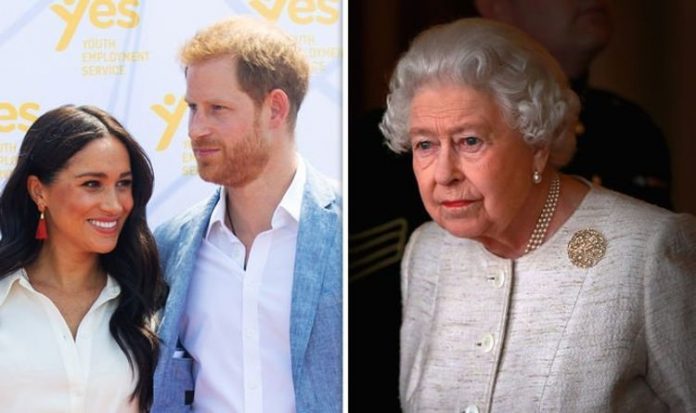Meghan and Harry have secured a historic £112million deal with the streaming service Netflix, which will enable their production company to make “informative” and “hopeful” documentaries. Just six months after leaving the Royal Family, the Sussexes have followed in the footsteps of the Obamas and set out to become Hollywood producers. It is not yet clear how much of the Netflix money will be paid towards Meghan and Harry, but they have already repaid the substantial £2.4million of taxpayer money spent renovating their Windsor home, Frogmore Cottage.
They have reportedly stopped receiving financial backing from Prince Charles’ Duchy of Cornwall, too, and have purchased a lavish mansion in the secluded city of Santa Barbara.
Tax adviser David Lesperance told Express.co.uk: “I suspect they have got a very good deal, they appear to have got a greater sum of money than the Obamas.”
However, he pointed out that some of the money will then go to the Sussexes’ production company.
Mr Lesperance added: “Depending on how the deal is set up, somebody will pay expenses, either Netflix or the production company.

Meghan Markle, Prince Harry and Queen Elizabeth II (Image: Getty)

Meghan and Harry have just signed a lucrative deal with Netflix (Image: Getty)
“Are those expenses to be borne by the Sussexes production company or Netflix?”
He also pointed out that they will have to pay corporate tax, and probably individual tax if the production company is not a not-for-profit.
The tax adviser then asked: “Where is that production company going to be located — California?”
He suggested that there was “no logical reason why it needed to be in the US” because, like the Obamas, they have a global status and are likely to have an international focus with their work.
He said this could be beneficial because “then you would eliminate, at a minimum, the federal corporate tax rate”.
READ MORE: Meghan Markle and Prince Harry in ‘huge dilemma’ over Netflix deal
Mr Lesperance explained that where the Sussexes set up their company depends on where the productions are based.
He continued: “If many of the productions are not in the US, I would advise them to set up outside of the US in a zero-tax jurisdiction, of which there are many.”
He also pointed out that the investors involved in production could influence the taxes of their production company.
The tax adviser explained: “If those investors are international, it’s easier to do it in a non-tax jurisdiction, for example, the Cayman Islands.
“The reason for that is nothing nefarious, it’s just much more simple.
“If you put [the production company] in the US and you had an investor from a non-dom, the UK, for example, the corporation will pay tax, the non-dom has to seek a refund, etc.
DON’T MISS
Prince Harry ‘so far gone Royal Family reconciliation looks unlikely’ [INSIGHT]
‘Meghan changed Harry too much’ Confession from Duke’s friend [EXPLAINED]
Harry and Meghan ‘always wanted independence AND publicity’ [EXPOSED]

The Duke and Duchess of Sussex’s production company is yet to be unveiled (Image: Getty)

Meghan and Harry have put down permanent roots in California, US (Image: Getty)
“Whereas if they live in the Cayman Islands, there isn’t any tax of that sort.”
Each individual investor then figures out what their own individual tax relationship is.
Mr Lesperance added: “If you think of Cayman as a tax neutral destination, it allows a multitude of investors from a variety of places to invest, and depending on what those investors’ tax situation is, they will do their own tax liability.“
Interestingly, the Cayman Islands came under scrutiny for its connection to royal finances back in 2017, due to the Paradise Papers’ investigation.
Approximately £10million of the Queen’s private money from the Duchy of Lancaster — which provides the monarch with an income — held funds in the Cayman Islands.
The Guardian explained at the time: “Investors who do not pay tax in the UK can face a tax bill if they invest in certain types of funds in the US, although the Duchy said it gained no tax advantage from investing via the Caymans.”

Royal Family news: A graphic depicting how the royal finances work (Image: Express.co.uk)
Approximately £5million was invested in Bermuda but that ended in 2010, while the rest went to the Caymans.
The BBC reported: “The two funds were based in British overseas territories with no corporation tax and at the centre of the offshore financial industry.
“But the Duchy said it was not aware there were tax advantages to it from investing in offshore funds, adding that tax strategy was not a part of the estate’s investment policy.”
A Duchy of Lancaster spokesperson said: “We operate a number of investments and a few of these are with overseas funds.
“All of our investments are fully audited and legitimate.
“The Queen voluntarily pays tax on any income she receives from the Duchy.”







